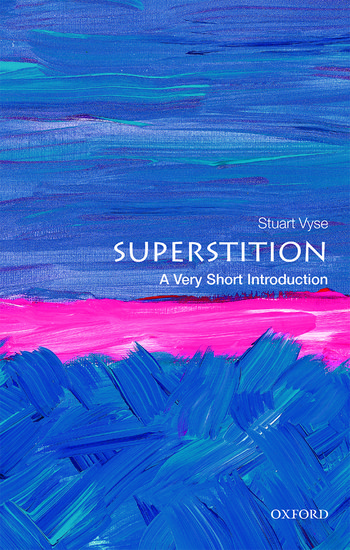Home >
A Very Short Introduction >
Superstition (Religion)
A Very Short Introduction | Religion
Superstition
ISBN: 9780198819257
Series: A Very Short Introduction
Superstition (Religion)
A Very Short Introduction Superstition (Religion) Media > Books > Non-Fiction > Education Books Expect Delays of Up to 4 Weeks| Order Below |
ISBN
9780198819257 (10-digit ISBN: 0198819250)
- Description
- Key Features
- Series Description
- Table of Contents
- Explores the history of our deepest superstitions, and the psychological reasons behind why they persist today
- Reveals the surprising connections between current everyday superstitions and the ancient world
- Provides an up-to-date assessment of the psychological foundations of superstitious belief
- Gives an overview of the fascinating array of contemporary superstitions throughout the world
Do you touch wood for luck, or avoid hotel rooms on floor thirteen? Would you cross the path of a black cat, or step under a ladder? Is breaking a mirror just an expensive waste of glass, or something rather more sinister? Despite the dominance of science in today's world, superstitious beliefs - both traditional and new - remain surprisingly popular. A recent survey of adults in the United States found that 33 percent believed that finding a penny was good luck, and 23 percent believed that the number seven was lucky. Where did these superstitions come from, and why do they persist today?
This Very Short Introduction explores the nature and surprising history of superstition from antiquity to the present. For two millennia, superstition was a label derisively applied to foreign religions and unacceptable religious practices, and its primary purpose was used to separate groups and assert religious and social authority. After the Enlightenment, the superstition label was still used to define groups, but the new dividing line was between reason and unreason. Today, despite our apparent sophistication and technological advances, superstitious belief and behaviour remain widespread, and highly educated people are not immune. Stuart Vyse takes an exciting look at the varieties of popular superstitious beliefs today and the psychological reasons behind their continued existence, as well as the likely future course of superstition in our increasingly connected world.
Oxford's Very Short Introductions series offers concise and original introductions to a wide range of subjects--from Islam to Sociology, Politics to Classics, Literary Theory to History, and Archaeology to the Bible.
Not simply a textbook of definitions, each volume in this series provides trenchant and provocative--yet always balanced and complete--discussions of the central issues in a given discipline or field. Every Very Short Introduction gives a readable evolution of the subject in question, demonstrating how the subject has developed and how it has influenced society. Eventually, the series will encompass every major academic discipline, offering all students an accessible and abundant reference library.
Whatever the area of study that one deems important or appealing, whatever the topic that fascinates the general reader, the Very Short Introductions series has a handy and affordable guide that will likely prove indispensable.
Please note: As this series is not ELT material, these titles are not subject to discount.
Introduction
1: The meanings of superstition
2: Religious superstition
3: Secular superstition
4: Superstition today
5: Why do people believe?
6: The future of superstition
Further reading
Index
Do you touch wood for luck, or avoid hotel rooms on floor thirteen? Would you cross the path of a black cat, or step under a ladder? Is breaking a mirror just an expensive waste of glass, or something rather more sinister? Despite the dominance of science in today's world, superstitious beliefs - both traditional and new - remain surprisingly popular. A recent survey of adults in the United States found that 33 percent believed that finding a penny was good luck, and 23 percent believed that the number seven was lucky. Where did these superstitions come from, and why do they persist today?
This Very Short Introduction explores the nature and surprising history of superstition from antiquity to the present. For two millennia, superstition was a label derisively applied to foreign religions and unacceptable religious practices, and its primary purpose was used to separate groups and assert religious and social authority. After the Enlightenment, the superstition label was still used to define groups, but the new dividing line was between reason and unreason. Today, despite our apparent sophistication and technological advances, superstitious belief and behaviour remain widespread, and highly educated people are not immune. Stuart Vyse takes an exciting look at the varieties of popular superstitious beliefs today and the psychological reasons behind their continued existence, as well as the likely future course of superstition in our increasingly connected world.
Key Features
- Explores the history of our deepest superstitions, and the psychological reasons behind why they persist today
- Reveals the surprising connections between current everyday superstitions and the ancient world
- Provides an up-to-date assessment of the psychological foundations of superstitious belief
- Gives an overview of the fascinating array of contemporary superstitions throughout the world
Series Description
Oxford's Very Short Introductions series offers concise and original introductions to a wide range of subjects--from Islam to Sociology, Politics to Classics, Literary Theory to History, and Archaeology to the Bible.
Not simply a textbook of definitions, each volume in this series provides trenchant and provocative--yet always balanced and complete--discussions of the central issues in a given discipline or field. Every Very Short Introduction gives a readable evolution of the subject in question, demonstrating how the subject has developed and how it has influenced society. Eventually, the series will encompass every major academic discipline, offering all students an accessible and abundant reference library.
Whatever the area of study that one deems important or appealing, whatever the topic that fascinates the general reader, the Very Short Introductions series has a handy and affordable guide that will likely prove indispensable.
Please note: As this series is not ELT material, these titles are not subject to discount.
EASY ORDER FORM
PRICES LISTED INCLUDE CONSUMPTION TAX
Price Before Tax:
¥1,790


